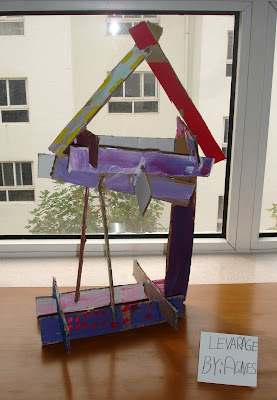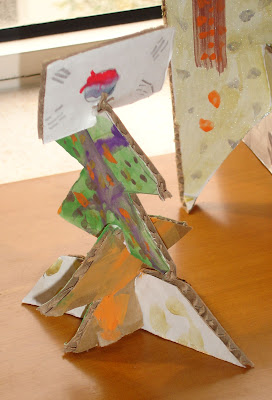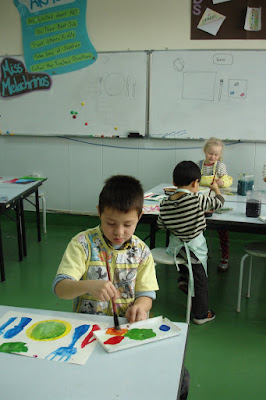Third grade is the only grade I have yet to write about. Funny, because I love the classes. I have two third grade classes and one ESL class that is a mix of second and third. I've been doing third grade projects with them.
Our second project for the year was a sculpture piece.
We spent a lot of time discussing the difference between 2D and 3D things. Alexander Calder was the artist inspiration. We looked at his stabiles and mobiles. You'd be surprised--even with 85% ESL students at our school, many of the kids were familiar with baby mobiles above cribs!
Calder took flat sheets of metal and combined them to create 3D sculptures. Obviously, we couldn't work in sheet metal. Instead, corrugated cardboard was the building material.

The project took three class periods. The first was construction. The second was construction and base coats of paint. The third was details with paint.
The idea for the project came from a project my co-op taught during my early field experience. She had more constraints on the assignment.
I just let the kids go for it! Some went abstract. Others went for representation. The goals for all students were stability and utilization of space.
One impressive sculpture was
Levarage by Agnes. First of all, the title! She's an ESL student. I'm not sure where she came up with the word "leverage." Second, she went for the open house feel. Some students were hesitant, but she jumped in. Right away, she cut her cardboard into these long strips. She then began assembling them, carefully balancing the beams to create her house.
Another fun sculpture from ESL: Christmas Tree Korea! Fred made this Christmas tree. For some reason, instead of a star or an angel at the top, it has the flag of South Korea. Our school is almost 70% Korean.
It's amazing where this flag shows up in art class. His tree is also partially orange. I'm not sure what that's about...apparently Asia doesn't limit Christmas to red and green.

As the weeks went on, I thought
"what am I going to do with all these sculptures?" Thankfully, I had counterspace to store them while in process. At the end of the project, I asked the librarian if we could use the top of the bookcases to display our work. She obliged, and we had instant exhibition space!
The kids titled their work and labeled small cards to place next to their work.
Transporting the sculptures down two flights of stairs and up two more, from the Fine Arts building to the Elementary building, was quite a feat! Some sculptures were in need of repair by the time we reached the library.
Overall, I think it was a success!
Here are the sculptures in the library:

 Our next third grade project involved drawing from observation. Once again, these kids blew me away!
Our next third grade project involved drawing from observation. Once again, these kids blew me away!
I borrowed a bike from a staff member. I rearranged the room so all the tables were around the perimeter of the room except for the middle table, which held the bike. (Note to self: this was a pain! The three classes meet on three different days! Lots of rearranging of tables and lifting of the bike...)
I told the students this was a challenge. Drawing a bike is a HARD THING. I had to draw a bike in high school. They were only in third grade!
Where do you even start?
Here's where I pulled out some Mona Brooks. I decided to forgo the "circle" and "dot" families (confusing for ESL students, since we're not talking about circles as defined in geometry).
Instead, we focused on straight lines, angled lines, and curved lines. With each type of line, we found examples on the bike. We also did some interesting body movements. Too bad I can't effectively demonstrate those on the blog. Here's my attempt:
Straight line: simple, arms out straight to the sides, parallel to the floor.
Angled line: a little "robot" or "walk like an egyptian" action here. bend at all the joints.
Curved line: ballerina bends here, trying to make your arms as curved as possible.
I tried to stress drawing what you see, not what you know. We looked at the bike from different angles. Sometimes, the wheels don't look like two big circles. Sometimes they look like rectangles. This was a challenge for some students. Some sat staring at the bike head-on, but drew the bike in profile. I told them what a lovely drawing they did, but that's what the bike looks like from the side. They should do another drawing to show me what the bike looks like from the front. We talked about squished circles, too, when the wheels were at an angle.
We began drawing with standard drawing pencils. Most of the class supply are HB. Some of the third graders had already discovered 2B and 6B among the bunch, and learned the difference. Still, basic graphite drawings. I told them to pick one part of the bike, draw it, then use lines to draw the part that connects to that, and then use lines to draw the part that connects to that, and then use lines to draw the part that connects to that.
When the kids told me they couldn't draw something, I asked them "what kind of lines do you see?" Once they told me, I said "Ok draw it."
Some students barely finished one drawing. Others did two or three. When they were finished, they moved to a new part of the room to draw the bike from a new angle.
The next week, I pulled out the ebony pencils. The richness of the line made for some interesting drawings. I stressed using the pencils in different ways--sometimes pressing lightly, sometimes pressing hard. Sometimes doing lines, sometimes filling in the shapes.
Some of these drawings were gorgeous! They had the perspective down a little better, and the variety of tones were so interesting!
Below is a drawing from that week. This student, Paul, draws such energetic scenes from his imagination. His understanding of perspective and line quality shocked me! To be so imaginative and also able to draw from observation beautifully! The front handlebars of the bike are rotated to the left, so the front wheel was angled, and thus a "squished circle."

When I look through all the drawings of the bike in his sketchbook, he just gets it. He sees it and he can tell me what he sees using the pencil! I can't believe a third grader did that drawing!
The third class period was colored pencils. We talked about naturalistic and expressive use of colors (without those terms).
At the end of each class period, each student picked their best drawing for the day. We gathered together and looked at all the best drawings. Sometimes we said two positive things about each work. Other times, we looked at drawings that effectively used value or color and discussed how they did that.
The fourth week started by looking through the sketchbooks. Each student picked their best drawing. Using that as a guide, they found the spot in the room where they could draw the same view of the bike. Each student got a larger piece of nice drawing paper (compared to the A4 copy paper of their sketchbooks). They did a similiar drawing, using the previous drawing as their guide. All class period was spent on this one drawing. As a final piece, these drawings were displayed around school.
Another reason why I love third grade: I stopped by a staff member's house last Friday. His son is in third grade. The son came up to me and said "I've been drawing my bike." See, in China, we keep bikes in our apartments. His is in his living room, and his mom confirmed that he's been drawing it on a regular basis!



















